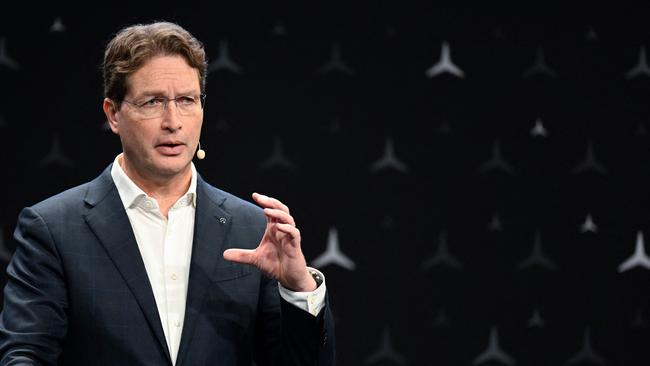Mercedes teams up with Google to accelerate driverless cars
The German marque has gone from competing with Google to partnering with the tech giant to make self-driving cars a reality.

Mercedes-Benz is partnering with Google to advance the development of self-driving cars, envisaging vehicles that can pick up children from school and deliver greater mobility to the elderly and people with disabilities.
Mercedes chief executive Ola Kallenius said the company was working with Google Cloud on “next level navigation features”, as it equips its cars with high-end computers to take advantage of the artificial intelligence boom.
“We’re partnering on one of the most exciting technology topics in our industry, automated driving,” Mr Kallenius said in front of a Mercedes-Benz S-Class car at Google Cloud’s annual Next event in Las Vegas.
“This beautiful car right here is equipped with a level three system for conditionally automated driving. We were the first manufacturer to get it certified in Germany, California, and Nevada.
“We will use Google Cloud as the backbone helping us to become even more efficient and flexible in our product development, and Google Cloud’s expert knowledge in processing massive amounts of data, and scaling AI workloads will ensure that our cars get even more intelligent.”
The automated driving developments expand on Mercedes’ partnership with Google, which it announced in February last year and initially focused on the German marque’s operating system. The deal also included integrating Google Maps to enable assisted driving features such as automatic speed adjustments before intersections, roundabouts or curves.
“Today, more than three million customers are using Google Places in their Mercedes cars. So we are applying Google Cloud AI across a number of other use cases ranging from a smart sales assistant, improving customer service in our call centres, and optimising our marketing,” Mr Kallenius said.

The partnership with Google represents a turnaround in strategy among traditional carmakers. Four years ago, Mercedes labelled Google a competitor in the autonomous driving race, with the threat so great that it had pushed it to work with rivals such as BMW.
“Google and Apple are directly competing with traditional car manufacturers such as Mercedes-Benz,” the car maker said at the time.
“In an effort to drive development forward as comprehensively and speedily as possible, Mercedes-Benz is working closely with suppliers, but also with universities and even competitors such as BMW. After all, automated and autonomous driving heralds a fundamental change in mobility.
“Parents could possibly even have their children picked up from school by a self-driving car if work takes longer than expected. Automated and autonomous driving could also enable older people or people with disabilities to participate more fully in society.”
Forecasts vary on when autonomous driving will become an everyday reality. BMW showcased its remote-controlled valet parking at CES, the world’s biggest consumer electronics show, in Las Vegas earlier this year. Polestar, meanwhile, expects the technology to hit the mainstream in the later part of the decade. Of course, like drone deliveries – in which Google, Amazon and other tech companies have a head start – the progress depends on regulators across different markets.
But deepening partnerships, as well as competing, with tech companies is not just about self-driving cars. Car infotainment systems – what are considered the last unconquered screen and a market worth $US1.5 trillion – have become a fierce battleground.
Car makers initially hoped to develop their systems in-house, despite having a patchy track record, given the upgrade cycles lag the tech titans who release new phones every year, backed by myriad software updates annually. Drivers have often complained about car manufacturers’ proprietary systems being clunky and less intuitive than the experience they can get on their iPhone or Android device.
Thomas Ingenlath, chief executive of Swedish-headquartered EV brand Polestar, told The Australian earlier this year that he doesn’t want to compete with Google. “What Google is interested in is totally different to what we want to achieve in the future,” he said.
And Mr Kallenius has a similar view. “Partnering with the very best in their respective fields is an important part of our software strategy – Google is the perfect example of that.
“With Google Cloud, Mercedes-Benz is building new ways to deliver the most intelligent vehicles to our customers and to create personalised, intuitive experiences.
“Each car should only get better over time, just like a good wine.”
And this starts even before a customer hops into a Mercedes. With the process of buying a car increasingly involving online research and shopping, Mercedes said Google Cloud’s AI technologies will help transform its e-commerce approach and make its “online storefronts a natural extension of the showroom floor”. In 2024, Mercedes plans to use Google’s Gemini AI model to deploy a new, smart sales assistant on its websites.

The car maker has already started using Google’s conversational Dialogflow AI model across its US call centres, and so far handled more than one million calls in more than 30 languages, handling queries on leases, payments or upgrading a vehicle. It plans to expand the technology to its other international markets.
Google chief executive Sundar Pichai said: “Mercedes-Benz has a long history of using technology to create exceptional experiences for their customers.
“We’re excited to help them apply Google’s advanced AI to engage with customers in new ways from improving customer service to optimising their website experience, with much more to come from this collaboration in the future,” Mr Pichai said.
The author travelled to Las Vegas as a guest of Google Cloud.




To join the conversation, please log in. Don't have an account? Register
Join the conversation, you are commenting as Logout